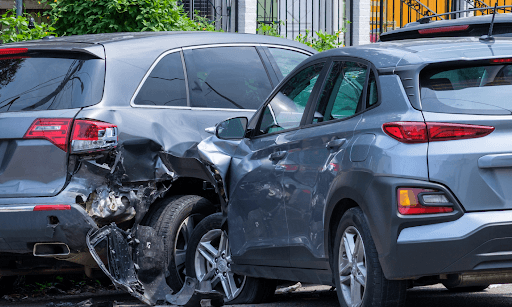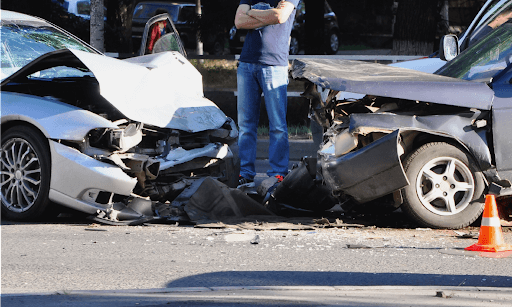According to Insurify, Georgia ranks as the 5th state with the most car accidents in 2022. In fact, the Peach State is considered to have some of the most dangerous roads in the country. This fact is further backed up when the at-fault accident rate in Georgia is 10.6%.
For these reasons alone, in our blog article, we will explain what a failure to yield accident is and how to prove liability to make sure you are compensated after being hit by another driver.
What is a failure to yield accident?

The most common failure to yield accidents occur when a driver fails to stop at a stop sign, yield sign, red traffic lights, or even fails to merge carefully onto the highway or street from a private driveway, ultimately causing a collision. With these car wrecks, it’s often the injury victims that are the ones that hit the at-fault driver.
Failing to stop or merge carefully is not the only reason these collisions occur. Other causes can be:
- Distracted driving
- Texting while driving
- Drunk driving
- Exceeding the speed limit
- Aggressive driving
- Tire or brake failure
- Wet or icy road conditions
Additionally, other situations where these car wrecks arise are:
- At four-way stops
- Unmarked intersections
- Left turns
- Rear-end collisions
- Stopped or stop-and-go traffic
- Construction zones
- Pedestrians crossing a crosswalk
- School bus stops
How to determine who’s at fault in a failure to yield accident?

Determining who is at fault in failure to yield collisions is all dependent on Georgia’s Law on yielding. Georgia Code §40-6-72 states: “After slowing or stopping, the driver shall yield the right of way to any vehicle in the intersection or approaching on another roadway so closely as to constitute an immediate hazard during the time such driver is moving across or within the intersection or junction of roadways”.
That being said, to prove that it was the other driver’s fault in a failure to yield accident, you have to:
- Call the respective authorities, such as the police and ambulance to receive an official report on the accident.
- Take pictures of your car’s damages, the accident scene, and injuries you might have gotten from the impact.
- Gather the other driver’s contact and insurance company’s information.
- If any witnesses saw the accident, get their contact information as well.
In addition, remember, don’t make the mistake of apologizing to the other driver since it can be considered as accepting blame for what happened; and when fighting for your compensation, the insurer can use this to not pay. Also, try to be as calm as possible and don’t get flared up.
After following these steps, you should seek guidance from an experienced auto accident attorney that can prove that the other driver was negligent in not obeying Georgia’s rules about yielding, which led to the cause of your collision.
Lastly, in failure to yield accidents, the officer that arrives at the scene can issue a ticket to the negligent driver immediately since it is easy to prove who was at fault. Keep this in mind: if a driver is legally required to yield according to the law and doesn’t do so, they are liable.
What kinds of compensation can you pursue in a failure to yield collision?
Like in all accidents, victims of a failure to yield collision can pursue compensation for their injuries and any material damage. This is done by negotiating with the other driver’s insurer to pay what is rightfully owed to them. But this process should be done alongside an attorney that knows how insurance companies operate.
The compensation that you can receive after being injured in these accidents are:
- Hospital, medical and surgery bills
- Lost wages according to the number of days you were out of work due to your injuries.
- Auto repair costs.
- Pain and suffering, such as any emotional trauma stemming from the injury.
- Any long-term care in case the accident caused you a disability.
- Vocational rehabilitation (if needed).
These costs and benefits can be fought to ensure the other driver’s insurer pays. However, it is recommended you keep detailed documents of medical reports of your injuries, hospital receipts, auto repair bills, and police reports.
Regardless of complying with calling the authorities right away after an accident and keeping track of all the documents required for your compensation, it’s not going to be an easy process to receive what you’re owed. Sadly, insurance companies, as friendly as they may seem, may not be keeping your best interest at heart.
By using tactics to scare off victims, such as speaking in technical jargon, using stalling strategies, not responding to emails, or offering an initial lowball offer, adjusters can take advantage of knowing that the injured are stressed and frustrated with their injuries.
For this reason, you shouldn’t negotiate with insurance companies by yourself. It is best to have a fighting attorney on your side to ensure insurance companies don’t run away with your money. Here at the Nick Schnyder Law Firm, we have what it takes to get our clients’ compensation, and if needed, we’re not afraid to go to court to plead your case.
We’re experts in winning failure to yield accident cases by determining liability and getting the compensation required for our clients. Contact us today for a free consultation of your case, or call us at (404)-999-1111.



